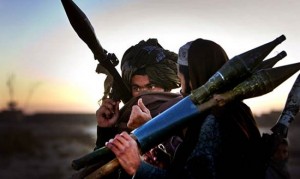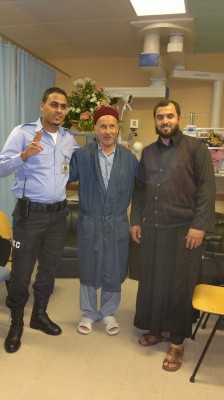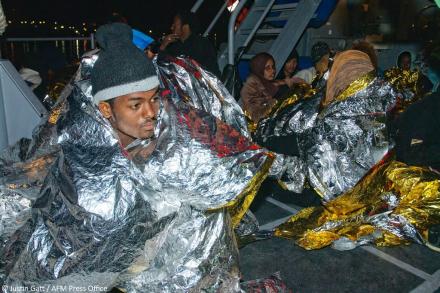By George Grant.
Derna, 31 May:
You can get a good signal from 100.2 Malta XFM on the approach to Derna, and on . . .[restrict]clear nights, the lights of nearby Crete can be seen twinkling in the distance.
But if some recent reports are to be believed, the extent of Europe’s influence on this small eastern Libyan town ends there. Derna, it is said, has an Islamist problem.

Upon arrival, there are few tangible signs of an Islamist presence. Many, if not the majority of men are clean-shaven or sporting designer beards, and clad in Western clothing. Amongst women, the burqa is almost nowhere to be seen. On the contrary, shop-window after shop-window is filled with the kind of slinky female attire that would have the hair of any good Salafist standing on end.
On the walls next to one of the main roundabouts into the town, a series of messages have been painted in English: “Yes to Pluralism”, one reads; “No to Extremism”, says another. “Libya is a Democracy”, shouts a third.
So far, so overhyped.
But there is usually no smoke without fire, and Derna must have acquired its Islamist reputation from somewhere. When Qaddafi tried to warn the West that last year’s revolution was backed by Al-Qaeda and other Islamist subversives, he singled out Derna as an example of what he meant.
In truth, such demonisation of opponents has long been a favoured tactic of demagogues around the world, and Qaddafi’s relationship with Derna was never a happy one. In 1970, just one year after Qaddafi swept to power in his Volkswagen Beetle, Derna rose up and forced the army to leave. When negotiations between the town and the new regime broke down, the persecution began, although the army did not succeed in re-entering Derna for another four years.
The 1990s was also a restive period. The year 1990 saw the founding of the Libyan Islamic Fighting Group (LIFG), an anti-Qaddafi insurgency that staged numerous attacks on regime targets in and around Derna, Benghazi and other towns in the east of Libya. Some analysts have linked the LIFG with Al-Qaeda, not least because many of its members had fought against the Soviets in Afghanistan in the 1980s. Fighting in Derna came to a head in 1995-1996, when Qaddafi’s forces went from house to house looking for rebels, many of whom were not part of the LIFG, in actions that Qaddafi subsequently recalled in his notorious Zenga Zenga speech last year.
Needless to say, none of this provides definitive evidence that Derna is especially “Islamist”, still less so if one means by that a subversive threat to Libya’s transition to a new democratic order.
Moreover, even if some members of the LIFG did have links with Al-Qaeda, that does not mean that all those who joined what was first and foremost an anti-Qaddafi movement felt the same way.
Perhaps the most notable example of Derna’s supposed Islamist inclinations is the scale of its contribution to the post-2003 insurgency in Iraq. When, in 2007, US forces discovered a list of 440 foreign fighters whose hometowns were recorded, it transpired that 112 came from Libya. Of that 112, fully 52 were from Derna. The town was the biggest single supplier of foreign recruits on the list, which, given it has an estimated population of just 80,000, is remarkable. Riyadh came second, providing 51 recruits, but the Saudi capital has a population of almost 4.5 million.
Here again, however, caution must be applied when ascribing motives. Rightly or wrongly, and I would argue wrongly, many of those who went to fight believed that they were participating in a legitimate jihad against foreign injustice. That does not mean they advocated establishing an Al-Qaeda-inspired theocracy back home.
This disconnect between perception and reality, which so often manifests itself in the mainstream debate about Islamists, becomes all-too clear when I meet one former jihadi who travelled from Derna to Iraq to join the insurgency immediately after the US-led invasion in 2003.
Sitting behind the counter of his hardware store in the centre of town, Ramadan Ben Khael certainly looks the part. Replete with a large black beard and flowing white robe, Ben Khael nonetheless offers me every hospitality as I begin to question him about his motives for going to fight the Americans.
“They were asking for volunteers to join the resistance”, he says. “I was a medical student at the time, and I went hoping to be part of the medical group. At first, people saw going to Iraq as a real jihad”.
Very soon, however, Ben Khael concluded that this ‘jihad’ was rather less honourable than he had been led to believe. “Saddam was just throwing us in front of the guns”, he says. “I realised that the whole thing was just political. I didn’t believe it was right, and so I left”. In all, Ben Khael was in Iraq for just eight days.
I ask him what he thinks of Al-Qaeda: “Al-Qaeda is a very great danger”, he says. “It is a primitive alliance. They target the youth; ignorant boys… The state needs to take care of the young. They need to be given a proper education about Al-Qaeda and the dangers it poses”.
And how strong is Al-Qaeda’s presence in Derna, I ask. “There are a few people who sympathise with them here, but no active members.”
If not a supporter of Al-Qaeda, does that mean that Ben Khael is a supporter of Libya’s efforts to transition to democracy. “My view on democracy is this”, he says. “I’m not OK with the process, but considering the alternatives, I believe it is the only way”.
When I tell Ben Khael that he has unwittingly just paraphrased the British wartime prime minister, Sir Winston Churchill, who said of democracy that it was “the worst form of government… except for all those others that have been tried”, he roars with laughter. Perhaps we are starting to get on.
And what of his fellow townsmen? Are they embracing the democracy project? “Whether it’s halal or haram, I have to say that people here have registered to vote in large numbers”.
Other residents of this town get visibly frustrated when it is suggested that Derna has made the journey from a favoured retirement destination for the Italians during the colonial era to a hotbed of Islamist militancy today.
“There are so many rumours”, laments Mohsen Benani, a one-time newspaper editor and grandson of a former mayor. “Things are very good here, but the town has a bad name. Derna could be a wonderful tourist destination, but not with a reputation like this”.
I ask him how many Salafists he believes there really are in Derna. “There are a few, as in almost every Libyan town. But it’s absolute nonsense to suggest that Al-Qaeda have bases here and that the Salafists are running everything.
“Recently, a group of Islamists claimed they were going to impose Sharia law in Derna. After that, Sadik Al-Ghariani, Libya’s Chief Mufti, came to Derna and addressed the Islamists at the Hamza mosque, where they worship. He told them that it was Islamic to support democracy and elections. He spoke against Takfir, and said that we should all respect one another. His speech was well received.”
I ask Benani whether Sharia courts are active in Derna. “There is a court here, which is used for personal issues; weddings and so forth. But if a crime is committed, the accused is sent to Benghazi for trial.”
The authorities in Derna concede that the lack of proper state structures is a real problem. “The government is absent here”, says Adel Anaiba, a member of the Derna Local Council. “There are no proper courts, no army and no police”.
In spite of that, Anaiba believes, things are moving forwards remarkably well. “There are fewer crimes here now than there were before the revolution”, he says. “The main problem we have had is with retribution against former Qaddafi supporters, but we have tried to stop that. A crime is still a crime.”
I ask Anaiba what he thinks about Derna’s Islamist reputation. “There has been a lot of exaggeration in the Libyan and international press about this”, he says.
“We had 33 registration centres for next month’s elections, and they were able to operate freely and without harassment from Islamists or anybody else. Women were registering with their children and nobody tried to stop them. Go out onto Derna’s streets, and you can see women driving cars. We have 140 civil society groups here in Derna and 40 of them are run by women. Universities are mixed. I myself am a professor at Omar Mukhtar University and I have seen no problems at all.
“Islamists fought in this revolution”‘ he adds, “and they are entitled to their views. The important thing is that they do not try to force those views onto anybody else. So far, they have not done so”.
This final observation is perhaps the most important, because such tolerance will be vital to the success of Libya’s democratic future. Strong and competing shades of opinion can peacefully coexist in a democratic society, so long as their adherents do not attempt to force those views upon others.
It is for this reason that ascertaining whether or not he feels the same way becomes the central objective of my subsequent interview with Derna’s most famous Islamist, Abdul Hakim Al-Hassadi; the man known as the “Emir of Derna” to his friends, and the leader of Al-Qaeda in Libya to his enemies.
When I spot him ordering cappuccinos and a large slice of cake under his umbrella in one of Tripoli’s swankier Italian-style cafes, he doesn’t much resemble either. Clad in a pinstripe robe and designer sunglasses, he stands to shake my hand as I approach, and ushers my wife, who has her head uncovered, to join his all-male group of friends.
Al-Hassadi led Derna’s Abu Salim Martyrs Brigade in last year’s revolution, and just as Qaddafi singled out Derna in general when warning of an Islamist presence in rebel ranks, so Al-Hassadi was singled out in particular.
This is the man who spent five years in Afghanistan under the Taliban, from 1997-2002, and is on record as praising Osama Bin Laden’s “good points”.
He has no qualms about giving his view that Libya should be an Islamic state, governed according to Sharia law. Nevertheless, as the context of the surroundings in which I find him perhaps suggest, Al-Hassadi’s views on democracy, women’s rights and the West are nuanced.
I begin by asking him what he was doing in Afghanistan in the first place. “Fleeing from Qaddafi”, he shoots back. “I left Libya in 1995, and spent two years moving amongst a number of Arab countries, but none were safe for me. Afghanistan was remote enough to truly be beyond Qaddafi’s reach”.
In contrast with earlier reports that he fought with the Taliban against the Northern Alliance in Afghanistan, Al-Hassadi insists he never joined the Taliban. “I didn’t come close to the Taliban”, he says. “I don’t know them.”
He says he fled Afghanistan to Pakistan in July 2002, following the NATO intervention, whereupon he was captured and promptly delivered into the hands of CIA interrogators in Islamabad. “They investigated me, but found nothing on me”, he insists. True or not, Al-Hassadi was subsequently sent back to Libya, where he spent the next six years in detention, before being released in 2008.
And what, I ask, does he think of the Americans now? “The Americans have made a lot of mistakes, but they did the right thing in Libya… Last year’s intervention certainly changed our perception of the Americans and NATO. We are thankful to Britain, France and all the countries who helped us. If you do not give thanks where it is due here on earth, then you are not thanking God”.
Al-Hassadi is also keen to emphasise his support for Libya’s democratic ambitions. “I believe in elections”, he says. “But transparency and integrity are key. We cannot allow fraud or vote-buying”.

But what if the people vote for a party that does not share his Islamist principles? “This is democracy”, he says. “If such a party is elected, I won’t like it, but I would accept it”. The same applies, he says, when it comes to accepting the rulings of the courts: “I wouldn’t like non-Sharia courts, but I would accept them”.
Al-Hassadi also emphasises his support for the rights of women to vote and work, as well as his support for people of different religions to live and worship freely in Libya. He does, however, draw the line when it comes to tolerating Muslims converting away from Islam. For them must be the death penalty. “But such occurrences are very rare”, he adds, unreassuringly.
Nonetheless, the conclusion I am left with is that Al-Hassadi, like his colleague Ramadan Ben Khael, is at least willing to give democracy a chance. Like all Libyans, it seems that both men have experienced enough tyranny to place some value in freedom of expression. Moreover, I am persuaded that these individuals represent only a small minority of opinion in Derna, which much more closely resembles other Libyan towns than rumour would suggest.
Derna appears to be not so much a town with an “Islamist problem” as a town with high expectations of what the alternative, democracy, can bring. Perhaps the greatest danger now is that those in government and other positions of power fail to deliver on these expectations in the coming months and years, because it is at that point that the siren-song of extremist ideology can start to take on fresh appeal. That, however, is very far from being just a Derna problem.
George Grant is Assistant Editor at the Libya Herald. He can be followed on Twitter @GeorgePBGrant.
[/restrict]









